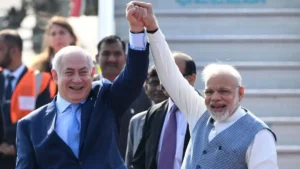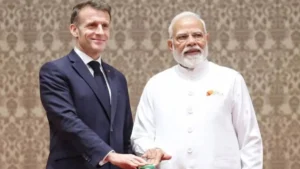In the wake of the recent terrorist attack in Moscow, believed to be perpetrated by extremists from Central Asia potentially influenced by Pakistani seminaries, India and Kazakhstan convened in Astana to bolster their collaboration against terrorism.
Key Discussion Points
Regional Terrorist Threats: Both nations engaged in discussions regarding the terrorist landscape within their respective regions. This included addressing state-sponsored terrorism and cross-border terrorist activities, particularly prevalent in South Asia.
Afghanistan-Pakistan Region: The meeting also delved into the specific challenges posed by terrorism in the Afghanistan-Pakistan region. Strategies were explored to combat the growing menace in this area, which often spills over into neighboring countries.
Key Points about Kazakhstan
- Geographical Location: Kazakhstan is the world’s largest landlocked country, located in Central Asia, bordered by Russia to the north, China to the east, Kyrgyzstan, Uzbekistan, and Turkmenistan to the south, and the Caspian Sea to the west.
- Capital and Major Cities: The capital city of Kazakhstan is Nur-Sultan (formerly Astana), while other major cities include Almaty, Shymkent, and Karaganda.
- Rich Cultural Heritage: Kazakhstan boasts a diverse cultural heritage influenced by its nomadic history and the convergence of various ethnic groups. Kazakh, Russian, and other ethnic groups contribute to the country’s multicultural society.
- Economy: Kazakhstan has a robust economy driven primarily by its vast reserves of natural resources, including oil, natural gas, coal, and minerals. The country has been focusing on economic diversification and modernization efforts to reduce its reliance on resource extraction.
-
Political System: Kazakhstan is a presidential republic, with Nursultan Nazarbayev serving as the country’s first president from independence in 1991 until his resignation in 2019. Kassym-Jomart Tokayev succeeded Nazarbayev as president.




 India Holds Spot as No. 2 Buyer of Russi...
India Holds Spot as No. 2 Buyer of Russi...
 PM Modi’s Historic Israel Visit: First I...
PM Modi’s Historic Israel Visit: First I...
 India Drops Most Favoured Nation Status ...
India Drops Most Favoured Nation Status ...








